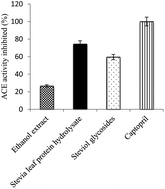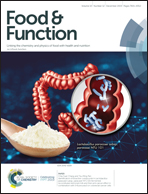Angiotensin-converting enzyme inhibiting ability of ethanol extracts, steviol glycosides and protein hydrolysates from stevia leaves
Abstract
Efficient treatment of hypertension is vital. The inhibition of angiotensin-converting enzyme activity has been one of the major strategies for treating hypertension. The ethanol extract of stevia leaves, steviol glycosides (with 95% purity; natural sweeteners widely used in the food industry) isolated from the ethanol extract and stevia leaf protein hydrolysates inhibited 26.60%, 59.56% and 74.38% of angiotensin-converting enzyme activities, respectively. Their effect was dose-dependent, which can be beneficial for avoiding hypertension or hypotension just by the proper control of the amount of their intake, and it was found to be superior to that of pharmaceutical drugs. A sensory test indicated that the application of the mixtures of steviol glycosides and stevia protein hydrolysates to decaffeinated coffee or tea as well as a formulated peanut protein drink was found to be well accepted, and an animal test showed that they had a significantly antihypertensive effect in spontaneously hypertensive rats. Steviol glycosides and stevia leaf protein hydrolysates can be good ingredients for making functional or healthy food products or beverages targeted for the prevention or treatment of hypertension.



 Please wait while we load your content...
Please wait while we load your content...